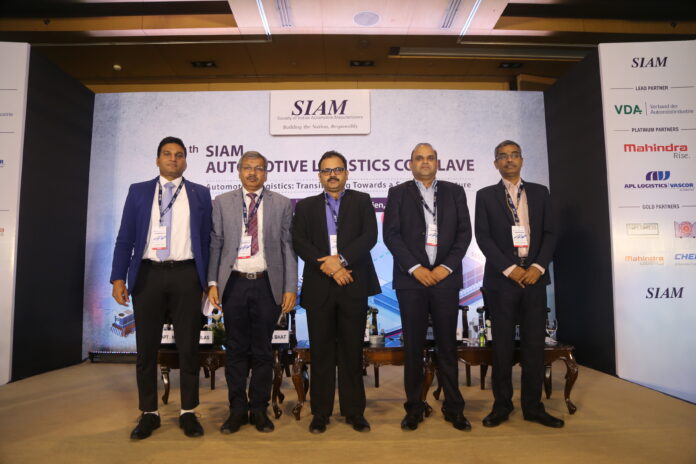New Delhi, August 19, 2022: Society of Indian Automobile Manufacturers (SIAM), the apex body of the automobile industry, organized the 8th SIAM Automotive Logistics Conclave. The conclave themed ‘Automotive Logistics: Transitioning towards a Sustainable Future’ focussed on exploring new frontiers for transportation of vehicles, in the view of the ever-changing business environment; and on improving logistic operations in the automotive sector. The conference witnessed active participation from several coveted speakers including senior Government officials, Logistics Heads of Automobile companies, and Experts from the automobile supply-chain.
The conclave was divided into five sessions i.e. “Leveraging Technology for Enhancing Road Transport Efficiency”, “Railways – The Road Ahead”, “Waterways – The New Frontier”, “Role of Multi-Modal Logistics Parks in Automobile Transportation”, and “Special Plenary Session: Path Ahead”.
Session – 1 was themed on “Leveraging Technology for Enhancing Road Transport Efficiency”. The panel consisted of eminent speakers talking about the developments happening across the Roadways sector, government policies, and vision change in last two years. Speakers included Mr. Rakesh K Sen, Co-Chairman SIAM Logistics Group & Vice President – Mahindra & Mahindra, Mr. R.S. Kapoor, Senior Adviser, Maruti Suzuki, Mr. Ashutosh Jha, Sales Director, Michelin and Mr. D K Rai, Director – Automotive, CHEP. The session was moderated by Mr. Sarbjit Singh, General Manager, Hyundai Motor India.
Mr. Rakesh K Sen, Co-Chairman SIAM Logistics Group & Vice President – Mahindra & Mahindra, said, “The two factors that matter the most are Operations need to ensure reduced logistics cost & time and Innovation is imperative in the ecosystem. Moving forward Sustainability is the need of the hour, and everyone needs to adopt the sustainable ways.”
Mr. R.S. Kapoor, Senior Adviser, Maruti Suzuki, said, “The Automotive Industry is evolving and is actively taking steps towards accomplishing sustainability. Sustainable Operations, Collaborations & Emerging Technology can further revamp the sector.”
Session – 2 was themed on “Railways – The Road Ahead”. The panel discussed Railways, as one of the future solutions for logistics across India. The role of railways in the logistics industry with future vision was kept forward for smoothening the supply chain during the discussion. It consisted of eminent speakers, such as Mr. Umesh Bhanot, Regional Head – South Asia, APL Logistics, Mr. Nitin Kulshrestha, COO, GATX India, Mr. Nanduri Srinivas, Director, Dedicated Freight Corridor Corporation of India, and Mr. Mudit Chandra, Executive Director (Freight Marketing), Railway Board. The session was moderated by Ms. Hena Kausar, Assistant Vice President, Maruti Suzuki.
Mr. Mudit Chandra, Executive Director (Freight Marketing), Railway Board, said, “The average speed of Railways has now improved. During the lockdown, Indian Railways had also focused on capacity enhancement. However, the availability of terminals is a major hindrance. However, new policies are coming in and we will see positive change in the coming 1.5 years.
ALSO READ : Taal Academy’s Independence Day Program is a success
Session – 3 was themed on “Waterways – The New Frontier” discussing Gati Shakti as an important step towards developing the inland waterways across the country. This panel consisted of eminent speakers such as Capt. Naresh Kundlas, General Manager, Parekh Marine Services, Capt. Jeetendra Bhat, General Manager, NYK Auto Logistics (India), Capt. Inderveer Solanki, Managing Director, Spring Professional Services & Consultant (STC), World Bank, and Mr. V. Ramachandran, Assistant General Manager, Hyundai Motor India. The session was moderated by Mr. Tejinder Gupta, Executive Director, Grant Thornton Bharat LLP.
Session – 4 was themed on “Role of Multi-Modal Logistics Parks in Automobile Transportation” discussing the way India is moving forward in developing the infrastructure and creating newer MMLPs across the states for increasing the efficiency of the supply chain aiding the manufacturing sector. The panel consisted of eminent speakers, including Mr. Achal Paliwal, Tower Head – Outbound Logistics, Tata Motors Business Services, Mr. Bharat Joshi, Director, Trac 1 Logistics, Mr. Sanjeev Patil, Vice President (Logistics), National Highway Logistics Management Ltd., and Mr. Amit Garg, Head – Domestic Rail Business, DP World. The session was moderated by Mr. Jaffrey Thomas, Partner, PwC.
Mr. Sanjeev Patil, Vice-President (Logistics), National Highway Logistics Management Ltd., said, “We are working with our partners to develop 35 future ready multi-modal logistic parks across India, which can be increased to 70 as per the industry’s demand. The Bharatmala and Gati Shakti schemes have given a strong foundation to the future of MMLPs.”
In the special address, Mr. Sanjay Bandopadhyaya, Chairman, Inland Waterways Authority of India said, “We are handling 2% of the current modal share of Inland Water Transport with a target of achieving 5% by 2030 and 7% by 2047. More vessels will be added that will make inland water transport more economical for operations.”
The conclave ended on a high note with the exchange of best practices, thoughts, and solutions, for the advancement of the automotive supply-chain.
About SIAM
The Society of Indian Automobile Manufacturers (SIAM) is a not-for-profit apex national body representing all major vehicle and vehicular engine manufacturers in India. SIAM works towards supporting sustainable development of the Indian Automobile Industry with the vision that India emerges as the destination of choice in the world for design and manufacture of automobiles. It also works towards facilitating enhancement of the competitiveness of the Indian Automobile Industry, reducing cost of vehicles, increasing productivity and achieving global standards of quality.
Visit EasyShiksha for skill development courses.




































































